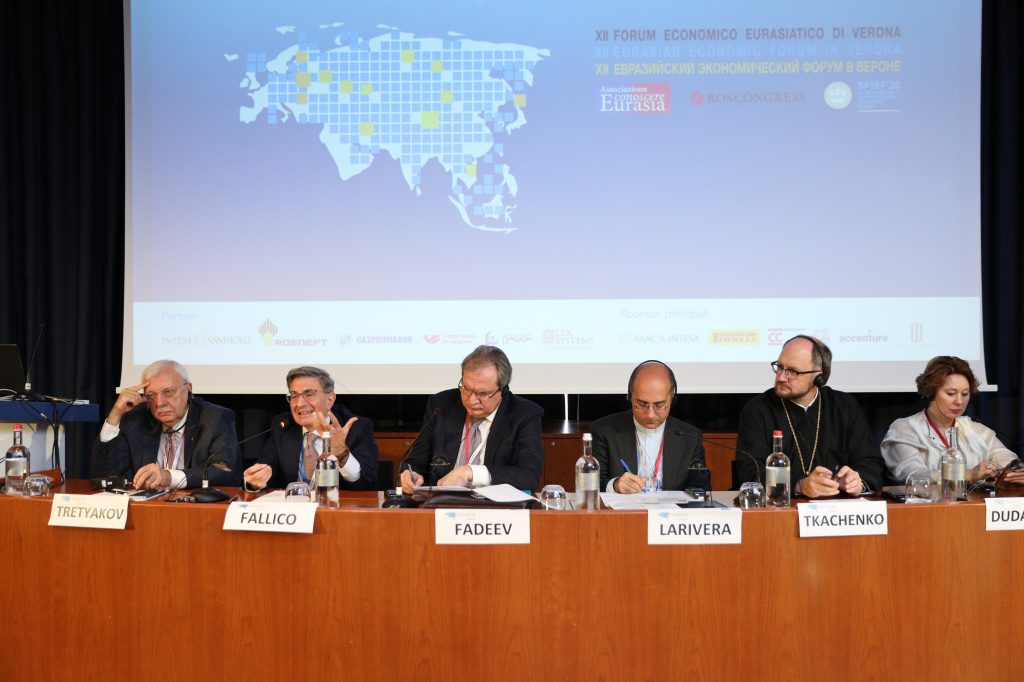
Verona Discusses Global Crisis and Consequences of Widening Social Inequality
A joint Civic Chamber of the Russian Federation and Roscongress Innosocium Foundation social platform session entitled “Social inequality is one of the causes of the current global crisis” took place in Verona as part of the XII Eurasian Economic Forum. The Forum was organized by the Roscongress Foundation and the Italian Know Eurasia Association Non-Profit Organization. The session’s global theme encompasses the interests of all parts of modern life, affects representatives of the business community and social, scientific, and cultural institutions alike.
The Forum was attended by political and public figures, representatives of business circles, diplomats, experts, and journalists from throughout Greater Eurasia. At the “Social inequality is one of the causes of the current global crisis” session, they gathered to discuss the challenges of the modern world and the consequences of deepening social inequality therein.
The session was moderated by Chairman of the Human Rights Council under the President of the Russian Federation Valery Fadeev. Taking part in the session were Chairman of the Board of Directors of Intesa Bank and President of the Know Eurasia Association (Italy) Antonio Fallico, Chairwoman of the Commission on Ecology and Environmental Protection of the Public Chamber of the Russian Federation Albina Dudareva, Economist Luciano Larivera, Chairman of the Commission on Charity, Civic Education and Social Responsibility of the Public Chamber of the Russian Federation Alexander Tkachenko, and Dean of Moscow State Higher School of Television Vitaliy Tretyakov.
Session participants discussed the diverse crises besetting the social and economic systems of the modern world. Inequality is a cause of conflict; it grows and inhibits development. In today’s world, rising wealth is combined with poverty and hunger, and inequality between the two poles is exacerbated by modern economic and social systems.
“The fundamental problems facing humanity cannot be resolved within the existing paradigm. The crisis returns over and over again. The great Russian-American sociologist Pitirim Sorokin believed that the crisis that broke out in the 20th century cannot be overcome within the framework of the old, “sensual” world. Mankind come to its senses a bit after the Second World War, the standard of living increased, but now even in the most prosperous countries the quality of life has ceased to do so. And this is an enormous problem. Sociologist Immanuel Verstehen said that the era of digital apartheid is coming, dividing social groups and countries. This is a grave danger. And we see it. We see vast consumption in those countries that can afford it. Hence the environmental crisis. You can believe in global warming, and you may not believe that it is the result of anthropogenic factors, but it is”, Fadeev said.
“The amount of resources consumed can be reduced exponentially. Modern technology makes it possible to create cars that will drive for 30 years. But when Mercedes created this kind of car in the 80s, people were horrified, realizing that now no one would buy more and more new cars. And now the cars are actually programmed to break in five to six years. If the goods are durable and people do not consume a lot, then what will we do with our workers? One solution is social services. People will help each other more, engage in a craftsmanship, create more beautiful things. The objection concerning ‘billions of unemployed workers’ is real, but it needs to be worked out. There should be calculations, models. Other models for life can be proposed. We must begin to think substantively about how to change the basic structures of human life. We need new theories – perhaps utopias – but we need courage to overcome these crises. Former Intesa Sanpaolo Bank head Giovanni Bazoli, in his book Market and Inequality, argues that capitalism in its current form is unable to overcome key social problems. We need this kind of courage”, the expert continued.
In seeking a possible solution to social problems, states turn to a variety of sources. “Justice can be defined as the equal accessibility of social services. The criterion is the ability to receive full social assistance wherever you live. In Russia, the centuries-old church experience in providing social assistance is taken up by the state, the state listens to legislative initiatives coming from religious leaders. That is, religious organizations participate in the formation of the state’s social policy. The state really believes that what the church does, it does much better than municipal or state bodies of social protection, education, and health. Therefore, it gives parishes subsidies and grants to include them in its professional sphere”, Tkachenko said.
Antonio Fallico noted that the economic problems that the world is experiencing are largely due to the excesses of the financial system. The interests of capital prevail not only in the economy but also in the policy of goods distribution. Development only under the conditions of wild capitalism harms both the environment and humans. It’s worth trying to find a more harmonious development that takes into account the interests of man, to make the relationship between the commercial and the social different from what it is now. In this regard, Antonio Fallico suggested not being limited to the Forum but creating a more permanent group and attracting experts to work in it who are not afraid to take a wide look at the existing world.
“Social inequality is a factor giving rise to territorial crises and contributing to the destabilization of the situation”, Deputy CEO of the Roscongress Foundation and Director of the Innosocium Foundation Elena Marinina said. “We need to understand that resolving issues of inequality will not only increase the overall quality of life but also serve as a direct opportunity to ensure the stability of the economic system.”








